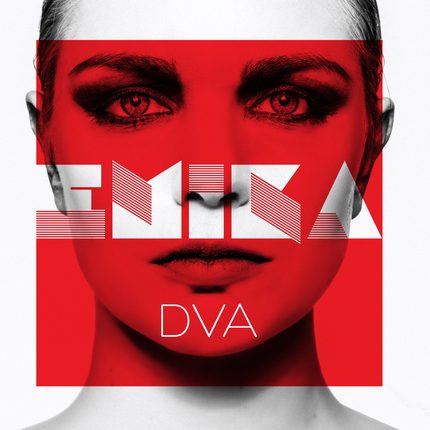Conjuring a world of late nights, romantic cruelty, and a dash of smoky hedonism, Ema Jolly’s 2011 self-titled Ninja Tune debut marked her out as one to keep a close eye on. Even if its rush of ideas and clash of genres didn’t quite gel, the combination of Jolly’s arresting, paper-thin vocal delivery with dirty basslines, synth squalls and moody atmospherics strongly hinted at good things to come from the best musician ever to have spent a significant amount of time in Milton Keynes.
DVA follows up by offering us two Emikas; moody prowler of the dancefloor and Serious Composer. It’s certainly a warmer offering than the heart-of-stone debut, more reliant on piano compositions than laptop obsession. The slinky ‘After the Fall’ boasts a wonderfully cheap-sounding 80s drumbeat and barbed lines, and its thrilling chorus tangles up voice and keys until it’s genuinely hard to tell them apart. ‘Sleep With My Enemies’, too, is a poppier, looser Emika, with strangled, almost-Middle Eastern synth adding to its enigmatic, sultry feel. And here’s a lyric to think about while you finish your lonely bowl of Choco Snaps: "The house on the hill is waiting for me. She sleeps naked, just like me". Well, quite.
Elsewhere, Emika joins such esteemed company as er, HIM and Stonesour (pro-tip: don’t ever leave Spotify running) in taking on Chris Isaaks’ swoony shuffler ‘Wicked Game’, and just about pulls it off. It’s a less unusual coupling than it might first sound, the simple Bm-A-E repetition lending itself well to Emika’s talent for wringing drops of trauma from what are in fact pretty straightforward songs. Honing in on the third verse’s ‘no one could save me’ line, Jolly throws in some harmonies, bathes the thing in cavernous echo and ends up making it her own.
Its when DVA peels off in a starkly different direction, as on the 28-piece orchestral number ‘Dem Words’, that the results are mixed. The track’s unquestionably pretty, but it’s also the only real point on the record where Jolly’s voice sounds ill-matched with its surroundings. Her low-key delivery works a charm when married to the marauding sub bass and diced-up piano of, say, ‘Sing To Me’, but here it gets lost in the sheer scale of her own composition.
Jarringly, the album also opens with ‘Hush’, another fully orchestral track, but one in which vocal duties are handed to soprano Michaela Srumova. Its a bold statement of intent, but its also much less enjoyable than the infectious boxing-ring-entrance horns of ‘Young Minds’. The best attempt at negotiating a peace treaty between her two sides comes on the gorgeous ‘Primary Colours’, a track as accomplished as the debut’s standout single ‘Professional Loving’. The final minute is worth the slow-burn beginning, a synth-line offering a light in the dark, while strings burst into bloom somewhere off-screen. Bringing to mind Post-era Bjork, it’s the record’s highlight, and hopefully points at a way forward.
DVA is probably a ‘transitional’ record. It does enough to ensure that Emika leaves what remains of dubstep behind, and cements her reputation as a talented producer brimming with ideas, but it also suggests a young artist not quite sure which strengths she wants to play to. By compartmentalising Emika as it does, DVA leaves a nagging sense that she’s still selling herself a little short.


